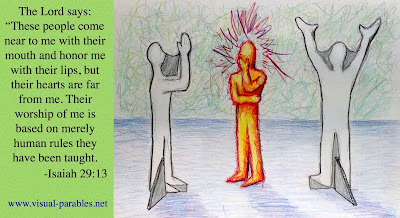We all live with the goal of being successful. We all may define it in very different ways, but in the end we are all motivated by success as we see it. Success is a concept that I've thought much about in recent days, as I have contemplated my future with Visual Parables, and my local church. One thing I have come up with is that everyone defines success in one of four broad categories.
The first of which is passion. That is a word that often has a negative stigma attached to it, but What I mean by that is that we have beliefs, convictions, and talents; and a desire to create something, help others, or inspire people with them. When you get down to it, if we are not passionate about what we do, we are doing just enough to get by. For the truly passionate person, motivation is not about, numbers, statistics, or money. Merely the message, vision, or the creation that they live and stand by. In a perfect world, the most passionate people would always be recognized for what they intend, and be seen as the most successful people. However, the reality is that the opposite is more often the case. Since passionate pursuits are often seen as a distraction from our hunt for personal glory, acceptance, and comfort by those who follow the world's definition of success. While many would like to say that they are motivated by passion, and not these other shallow options. I seriously doubt it is absolutely true most of the time. Human nature is just that pervasive. Plus, the worlds influence is just that widespread, that it taints even good passions.
The second motivator is glory. Those who are motivated by glory seek, fame, fortune, and praise; all for the sake of their pride, ego, and vanity. Many a talented and passionate people are pushed into this, even if that is not what they want. The world has this unrelenting belief that talent belongs in the lime light. The problem is that there is only room for about 1% of the talented people in any given medium as far as fame goes. Plus, not all talented people are emotionally equipped to deal with that much attention and scrutiny that comes with fame. The movie The Soloist is a good example of this. Not to mention that the lime light is controlled by a lot of very greedy people, who are motivated by wealth, and not artistic integrity. So for those who make it to the big time, often get there by compromising their passion somehow.
Which leads to our third motivator, comfort, which can take on many forms. Many equate wealth with comfort, provided it is merely received and not worked for; which isn't very realistic. For others, it's about an absence of drama. They get on top of their world by shielding themselves from stress, challenges, criticism, and being questioned. For others comfort is relational, it's all about being loved, or at least as close a facsimile to love they can manage to manufacture.
Many people who seek comfort, for comforts sake often find just the opposite. Those who want the world to revolve around their comfort, often invite a lot of scrutiny in doing so, which is the last thing that they want. Those who seek comfort in love often take on many unloving characteristics; like impatience, unkindness, rudeness, and criticism in order to seize control of how they are loved. Yet, they often end up destroying the love they seek by doing so, and breaking their own heart in the process, but will always blame someone else for it. Those who seek comfort in wealth often live in absolute fear of losing their fortune for which they place all their hope. Which robs them of their peace as they strive to maintain their success, rather than enjoy it.
The fourth motivator is acceptance, which can very much overlap with love based comfort. We all have a run in with this at some point in our lives, especially in our adolescence as we seek validation through approval. In those critical years that we should be discovering whom God made us to be, we are merely imitating one another for the sake of acceptance. The worst part is that many never grow out of it. I contend that so many people suffer mid-life crises' is because they set such a poor foundation in their youth. All because they sought acceptance from the world, and not God. They let the world define them, and not their creator. It is only in mid-life do people realize that is not enough, and that they have no idea who they really are. Rejection is a reality we all face some time, but the more we look to acceptance to validate us, the more rejection will devastate us.
So what should motivate the disciple? All we have to do is look to Jesus, and examine what motivated him, and try to do the same. Was he motivated by acceptance? In John 6:60-71 it says that many of his followers left because his teaching was too hard. Yet, he made no attempt to stop them, nor did he altar his message or methods because of it. So clearly he was not motivated by acceptance. Was Jesus motivated by comfort? In Matthew 8:20 Jesus says "foxes have dens birds have nests, but the son of man has no place to lay his head." Clearly Jesus was not motivated by comfort to say such a thing. What about glory? On many occasions and in many ways Jesus made it clear that he sought his father's glory, not his own. Since his true passion was his father's glory, his father's will, his father's truth. Can you say the same as a Christian? Can your church say the same? I think we all should be asking ourselves this question in 2017.
With all that being said I would formally resolve to be motivated by righteous passion in 2017. Easy to say, but not so easy to live by when the world wants to beat you down and force you into their shallow mold. Not so easy when human nature looks to success to motivate us. Admittedly, when I started my Visual Parables venture into self-publishing, I did it partly because I believed that talent must seek the lime light to have value like so many others. Which has not always served my passionate integrity. Not that I regret doing it, for it has been revealing. It has given me better insight into the nature of the challenges that the church faces from within. Even if that was not a goal of the project.
That insight is easily illustrated with social media, since it is a reflection of our society. It’s not casting a very pretty picture either. Being a part of it, I've experienced how hard it is to stand out in the midst of all the silly and angry posts that flood it. Yet, I've noticed that the faith based posts that receive the most attention are very vague, or simply warm and fuzzy. They mean something to those in the know, but nothing to the nonbelievers. They merely serve as a rallying point for Christians. So nobodies knowledge, understanding, or passions are expanded at all. What does that say about the church universal? I could never in good conscious resort to such shallow means of soliciting "reactions" for the sake of glory or acceptance. Which means mission based pages like mine have to spend more and more boosting their posts to make sure their audience actually sees their message. But are we doing it for Christ like passion, or just the vanity of worldly success.
So that means, you may not be seeing as much of me in 2017. Not that I will be abandoning Visual Parables. I just won't be making Facebook CEO's wealthier by boosting my posts this upcoming year. I’ll let God use my messages as he wills, not as my pride desires. I won’t be judging my success by the number of “Likes” I get. However, if you want to ensure you see my posts, click on "see first" under "following."
 |
| click to enlarge |
The Visual PARABLEist
 |
| click to enlarge |










